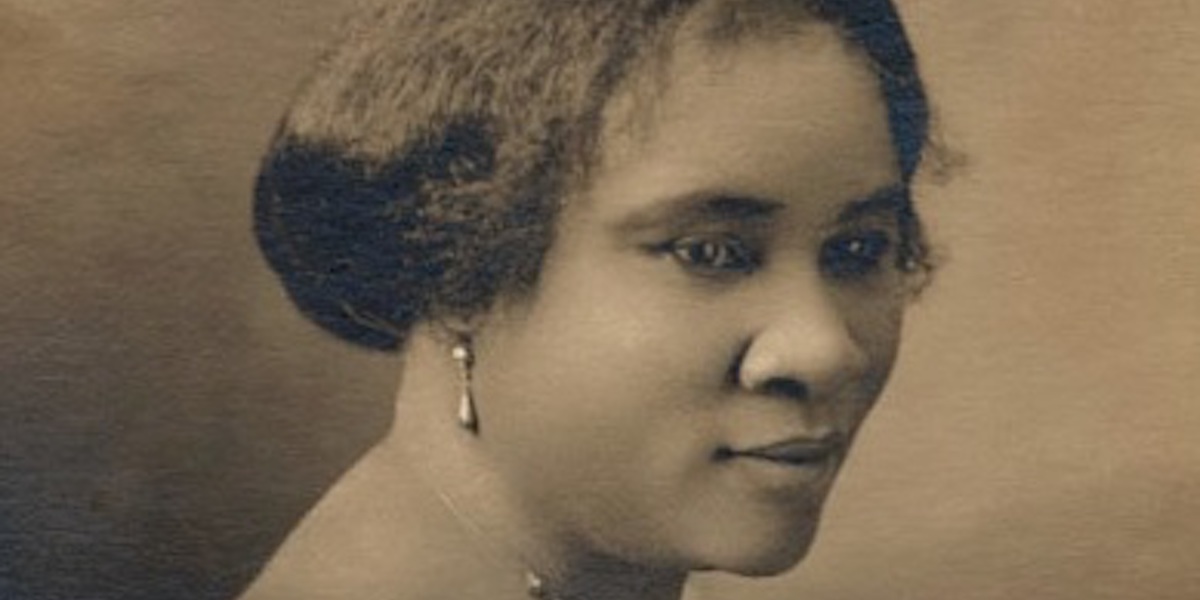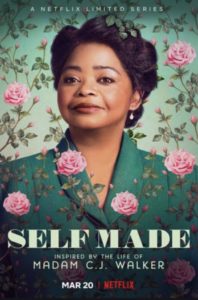
27 Mar 2020 Netflix and Learn: Honoring Black Entrepreneurship
 Coronavirus binge-watching doesn’t need to be exclusively “The Mandalorian,” “Game of Thrones” or “Tiger King.”
Coronavirus binge-watching doesn’t need to be exclusively “The Mandalorian,” “Game of Thrones” or “Tiger King.”
I was excited to watch “Self Made,” a four-part miniseries on Netflix about the real-life rise of Sarah Breedlove from dirt-poor washerwoman to America’s first self-made female millionaire.
Adopting the name Madam C.J. Walker, Breedlove built a business empire creating and selling haircare products to other black women in the early 20th century. She created an industry that not only catered to an underserved demographic, but also enhanced opportunities for black women in workplace roles previously unavailable to them.
Outside of a postage stamp in 1998, Walker’s compelling story has largely gone overlooked. This is a shame. Even Netflix’s premiere missed the extra notoriety it might have gotten during Black History Month. I think her story is so inspiring that I pushed long ago for her portrait to be featured on our currency.
Late in the Obama presidency, then-Treasury Secretary Jack Lew announced that abolitionist Harriett Tubman would replace President Andrew Jackson on the $20 bill by 2020. But that process is delayed due to anti-counterfeiting concerns related to the design of the new bill.
With no disrespect intended toward Tubman – the icon of the Underground Railroad – I backed Walker in a 2015 New Visions Commentary published by Project 21:
Since it’s money, how about having the first woman immortalized on paper currency be the first female self-made millionaire in American history?
Madam C.J. Walker is that woman, and her inspiring story makes her an ideal candidate.
Before Tubman was designated as the new face of the $20 bill, there were plenty of political/feminist suggestions for the honor. Walker didn’t even make the list! I was particularly critical of the efforts of the group Women on 20s, which was engaged in lobbying the White House:
This group, however, doesn’t just want any woman. They want a woman of their own choosing. They will send President Barack Obama the specific woman they think should grace a future $20 bill. Civil rights icon Rosa Parks, abolitionist Harriet Tubman and former first lady Eleanor Roosevelt were selected through an online vote from their 15 top choices. A fourth, Wilma Mankiller, the first female elected as a Native American tribal leader, was added “by popular demand” and as an obvious statement about the harsh Native American policies during the Jackson presidency.
All of these candidates share the distinction of being feminist icons, well-known historical figures or both. If this must be done at all, why not make a bold choice — one that’s free of a political agenda?
I explained how Walker earned the honor: by meeting and surpassing many of the same expectations faced by the more politicized suggestions.
Walker persevered in a male-dominated era where separate-but-equal Jim Crow discrimination was the law of the land. She saw how other businesses ignored black customers, and she stepped in to fill the void and became a success.
At the same time, she created jobs and new wealth in the black American community. She founded institutions that educated tens of thousands of “Walker Agents” and built factories to make her products. In 1914, Walker told the National Negro Business League: “I am not merely satisfied in making money for myself, for I am endeavoring to provide employment for hundreds of women of my race.”
Netflix’s series is “inspired by” Walker’s life. There are obviously conversations that were dreamed up by screenwriters and events that never happened. While the series is based on a biography written by Walker’s great-granddaughter, there are also Hollywood additions to the story that are disputed by the author, such as a potential lesbian relationship involving historical characters.
Nonetheless, “Self Made” is an inspiring story that is indeed binge-worthy. And, for older children, it’s a great history lesson that they likely wouldn’t hear if classes were in session.
To read my entire 2015 commentary, click here.



